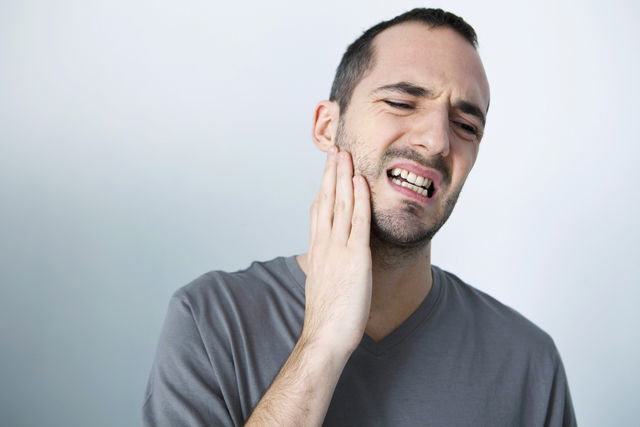Jaw pain can be very uncomfortable, and can occur for many reasons, like after direct trauma to the face, an infection or teeth grinding. It is a common symptom many of TMJ (temporomandibular joint) disorders, which are usually characterized by abnormalities in how this joint connects the skull to the jaw.
In most cases, jaw pain can be very limiting, and is associated with other symptoms, like difficulty eating or speaking. It can even cause swelling and pain within the ear.
It is important to see a doctor if you experience jaw pain. The doctor will assess jaw functioning, evaluate your symptoms and determine a diagnosis to guide treatment and pain relief.

What causes jaw pain?
The main causes of jaw pain are:
1. TMJ disorders
TMJ disorders are associated with abnormalities in the way this joint connects the skull to the jaw. This joint is responsible for opening and closing the mouth.
Abnormalities to this joint and the muscles surrounding it can cause small cracking sounds with movement or chewing, as well as facial discomfort, headache and even facial swelling.
What to do: It is important to see a dentist if you suspect a TMJ problem. The dentist will assess the joint and recommend treatment as necessary, which will depend on the symptoms and underlying cause of jaw pain. Treatment may include physiotherapy, mouth guards for sleeping or anti-inflammatories to relieve pain. If pain does not improve or if it radiates to other areas, surgical repair may be necessary.
2. Direct trauma
Direct trauma to the face can lead to jaw pain, especially if it results in joint dislocation or a bone fracture. Jaw pain, in these cases, may also present with local swelling, bleeding and bruising.
What to do: Very severe impacts to the face should be assessed by a doctor to rule out dislocation or fractures. These conditions require more specific treatment, like immobilization, surgery or physiotherapy.
3. Bruxism
Bruxism is characterized by unconscious grinding of the teeth that can happen when sleeping or during stressful situations. This grinding can increase pressure on the jaw and surrounding muscles, resulting in pain. Other signs of bruxism include tooth breakdown, headaches when waking up and softening of the teeth.
What to do: It is important to consult a dentist if you suspect you grind your teeth. The dentist may recommend the use of a mouth guard to protect your teeth and jaw when sleeping.
4. Dental problems
Dental problems, like gingivitis, cavities or gum abscesses, can cause jaw pain, especially if these conditions are left untreated or poorly managed by the dentist. Although they do not affect the jaw directly, they can impact how you move your jaw, which can cause pain.
What to do: You are advised to see a dentist to address and dental pain. Dental hygiene is just as important, and you should brush your teeth at least 3 times per day and regularly use floss. Dental abscesses may require antibiotics for treatment.
5. Osteomyelitis
Osteomyelitis is characterized by bone infection and inflammation, and it can affect the jaw bone and TMJ. This condition is associated with pain, as well as fever, local swelling and difficulty moving affected joints.
What to do: It is important to see your doctor or dentist if you suspect you have osteomyelitis. They will be able to order testing that helps to confirm a diagnosis and guide the right treatment.
In addition to prescribing antibiotics, the doctor may recommend surgery to remove parts of the bones that are affected. It is important for osteomyelitis treatment to be prompt to prevent spreading of bacteria and further complications.
6. Jaw cancer
Jaw cancer is a rare form of cancer that involves the growth of a tumor in the jaw bones. It can cause jaw pain that worsens as the tumor grows, as well as swelling in the throat area, bleeding in the mouth, numbness, tingling and headaches.
What to do: It is important to see a doctor if you have symptoms that last for over a week. The doctor will order testing to confirm a diagnosis, and results will help to guide treatment.
Depending on the stage of cancer, the doctor may recommend surgery to remove cancerous tissue and to install a prosthesis, as well as radiation therapy.
